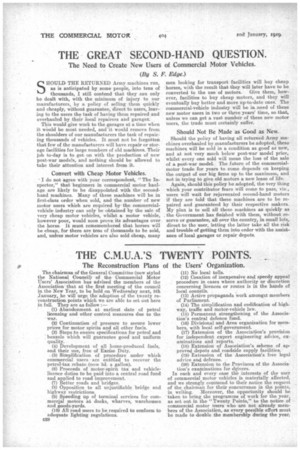THE GREAT SECOND-HAND QUESTION.
Page 8

If you've noticed an error in this article please click here to report it so we can fix it.
The Need to Create New Users of Commercial Motor Vehicles.
(By S. F. Edge.)
SHOULD THE RETURNED Army machines run, as is anticipated by some people, into tens of thousands, I still contend that they can only be dealt with, with the minimum of injury to our manufacturers, by a policy of selling them quickly and cheaply, without guarantee, direct to users, leaving to the users the task of having them repaired and overhauled by their local repairers and garages.
This would give work to the garages at a time when it would be most needed, and'it would remove from the shoulders of our manufacturers the task of repairing thousands of vehicles. It must not be forgotten that few of the manufacturers will have repair or storage facilities for large numbers of old machines. Their job to-day is to get on with the production of new post-war models, and nothing should be allowed to take their attention and interest from it.
Convert with Cheap Motor Vehicles.
• I do not agree with your correspondent, "The Inspector," that beginners in commercial motor haulage are likely to be disappointed with the secondhand machines. Many of these machines will be in first-class order when sold, and the number of new motor users which are required by the commercialvehicle industry can only be obtained by the sale of very cheap motor vehicles, whilst a motor vehicle, however poor, would soon prove its advantages over the horse. It must rememembered that horses will be cheap, for there are tens of thousands to be sold, and, unless motor vehicles are also sold cheap, many men looking for transport facilities will buy cheap horses, with the result that they will later have to be converted to the use of motors. Give them, however, facilities to buy cheap motors, and they will eventually buy better and more up-to-date ones. The commercial-vehicle industry will be in.need of these new motor users in two or three years' time, so that,. unless we can get a vast number of these new motor users, the trade must certainly suffer.
Should Not Be Made as Good as New.
Should the policy of having all returned Army machines overhauled by manufacturers be adopted, these machines will be sold in a condition as good as new, and at not very much below post-war model price, whilst every one sold will mean the loss of the sale of a post-war model. The future of the commercialmotor trade for years to come depends on keeping the output of our big firms up to the maximum, and not in trying to give old motors a new lease of life.
Again, should this policy be adopted, the very thing which your contributor fears will come to pass, viz., users will wait for rejuvenated second-hand motors if they are toldthat these machines are to be repaired and guaranteed by their respective makers. My plan is to sell all these machines as quickly as the Government has finished with them, without reserve or guarantee, all over the country, in small lots, direct to the user, letting the latter take all the risk and trouble of getting them into order with the assistance of local garages or repair depots.






















